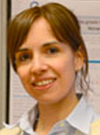
Contributions
Abstract: EP1484
Type: Poster Sessions
Abstract Category: Pathology and pathogenesis of MS - Environmental factors
Background: Obesity increases the risk of multiple sclerosis (MS), but mechanisms behind this are unknown. The adipokines leptin and adiponectin are secreted by fatty tissue and have inflammatory properties. They could therefore be possible biomarkers of disease course and treatment response in MS.
Objective: To explore if adiponectin and leptin were associated with MS disease activity and could have a potential as biomarkers of MS disease activity and interferon beta (IFNB)-treatment response.
Methods: Cohort study of 88 patients with relapsing-remitting MS followed for two years with clinical scoring, repeated MRI scans and serum measurements, 6 months before and 18 months during IFNB-treatment. Association between serum level of adipokines and MRI activity were assessed by a generalized linear mixed model.
Results: The levels of leptin were lower (p=0.008) and the levels of adiponectin higher (p=0.037) during IFNB-treatment as compared to the treatment-naïve period reflecting the anti-inflammatory effect of the drug, but the changes in serum levels were not associated with disease activity. There was no association between serum-levels of leptin (OR= 0.99 (0.99-1.00; p=0.66)) or adiponectin (OR=1.02 (0.96-1.08; p=0.52)) and MRI disease activity. This was consistent before and during IFNB-treatment and after adjustment for age, gender and BMI. 18% of the patients obtained NEDA-3 status during IFNB-treatment, but there was no difference in serum adipokine levels between these patients and the patients that had disease activity. There was no association between serum-leptin level and EDSS score at baseline (p=0.89).
Conclusion: Our findings indicate that serum-leptin and adiponectin do not have a profound role in the immune mechanisms of MS-disease activity, and are therefore not suitable as potential biomarkers of disease activity or IFNB-treatment response in RRMS.
Disclosure: This study was supported with unconditional research grant from Novartis and Biogen Idec. SSK have received unrestricted grants from Novartis and Biogen Idec.
KMM has participated on scientific advisory boards for Novartis Norway, Biogen Idec, and Genzyme; received funding for travel from Bayer, Novartis, Merck-Serono and Biogen Idec; received speaker honoraria from Bayer, Genzyme, Sanofi-Aventis, Novartis, Merck-Serono and Biogen Idec; and received unrestricted research support from Bayer, Sanofi-Aventis, Novartis, Merck-Serono, Biogen Idec, Pronova Biocare and Norwegian MS Society.
TH has received speakers honoraria, and/or served on advisory board, and/or received unrestricted research grants from Biogen, Roche, Merck, Novartis, and Genzyme
JSB has no disclosures
Stig Wergeland has received honoraria as speaker from Novartis, Sanofi-Aventis and Biogen. Antonie Giaever Beiske received speaker honoraria from Merck Serono, Teva, Biogen Idec and Norwegian MS Society and travel funding from Teva. KSB has no disclosures
HH has no disclosures
R. Midgard has served on scientific advisory boards for Novartis Norway and Merck Norway and has received travel funding and/or speaker honoraria from Biogen, Novartis Norway, and Sanofi Genzyme.
JS has no disclosures
ØT has participated on scientific advisory boards for Biogen Idec, Genzyme and Merck-Serono and received speaker honoraria and travel grants from Genzyme, Merck-Serono, Novartis and Biogen-Idec.
Abstract: EP1484
Type: Poster Sessions
Abstract Category: Pathology and pathogenesis of MS - Environmental factors
Background: Obesity increases the risk of multiple sclerosis (MS), but mechanisms behind this are unknown. The adipokines leptin and adiponectin are secreted by fatty tissue and have inflammatory properties. They could therefore be possible biomarkers of disease course and treatment response in MS.
Objective: To explore if adiponectin and leptin were associated with MS disease activity and could have a potential as biomarkers of MS disease activity and interferon beta (IFNB)-treatment response.
Methods: Cohort study of 88 patients with relapsing-remitting MS followed for two years with clinical scoring, repeated MRI scans and serum measurements, 6 months before and 18 months during IFNB-treatment. Association between serum level of adipokines and MRI activity were assessed by a generalized linear mixed model.
Results: The levels of leptin were lower (p=0.008) and the levels of adiponectin higher (p=0.037) during IFNB-treatment as compared to the treatment-naïve period reflecting the anti-inflammatory effect of the drug, but the changes in serum levels were not associated with disease activity. There was no association between serum-levels of leptin (OR= 0.99 (0.99-1.00; p=0.66)) or adiponectin (OR=1.02 (0.96-1.08; p=0.52)) and MRI disease activity. This was consistent before and during IFNB-treatment and after adjustment for age, gender and BMI. 18% of the patients obtained NEDA-3 status during IFNB-treatment, but there was no difference in serum adipokine levels between these patients and the patients that had disease activity. There was no association between serum-leptin level and EDSS score at baseline (p=0.89).
Conclusion: Our findings indicate that serum-leptin and adiponectin do not have a profound role in the immune mechanisms of MS-disease activity, and are therefore not suitable as potential biomarkers of disease activity or IFNB-treatment response in RRMS.
Disclosure: This study was supported with unconditional research grant from Novartis and Biogen Idec. SSK have received unrestricted grants from Novartis and Biogen Idec.
KMM has participated on scientific advisory boards for Novartis Norway, Biogen Idec, and Genzyme; received funding for travel from Bayer, Novartis, Merck-Serono and Biogen Idec; received speaker honoraria from Bayer, Genzyme, Sanofi-Aventis, Novartis, Merck-Serono and Biogen Idec; and received unrestricted research support from Bayer, Sanofi-Aventis, Novartis, Merck-Serono, Biogen Idec, Pronova Biocare and Norwegian MS Society.
TH has received speakers honoraria, and/or served on advisory board, and/or received unrestricted research grants from Biogen, Roche, Merck, Novartis, and Genzyme
JSB has no disclosures
Stig Wergeland has received honoraria as speaker from Novartis, Sanofi-Aventis and Biogen. Antonie Giaever Beiske received speaker honoraria from Merck Serono, Teva, Biogen Idec and Norwegian MS Society and travel funding from Teva. KSB has no disclosures
HH has no disclosures
R. Midgard has served on scientific advisory boards for Novartis Norway and Merck Norway and has received travel funding and/or speaker honoraria from Biogen, Novartis Norway, and Sanofi Genzyme.
JS has no disclosures
ØT has participated on scientific advisory boards for Biogen Idec, Genzyme and Merck-Serono and received speaker honoraria and travel grants from Genzyme, Merck-Serono, Novartis and Biogen-Idec.


